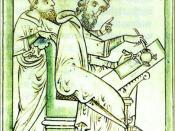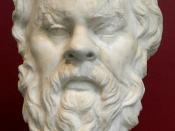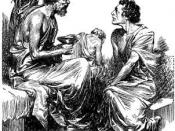Cognitional operations are conscious operations. We are fully aware of what we are seeing, hearing, imagining or recalling. The cognitional process is a process whereby humans advance in knowledge and develop their world view. There are four levels of the cognitional process. Each level has a Speculative (question) and Practical (answer).
Level 1 is Experience. It is obtained through the senses. Level 2 is Understanding.
"What? Who? When? Where? How?"ÃÂ By asking these questions, we gain knowledge to aid in our understanding. Level 3 is Judgment. "Is it real? Are you sure?"ÃÂ This is where we discover and/or decide truth. Some are glad to have reached an answer and tend to stop after this and don't go on to level 4 which is Response. "How will this information benefit in the future? Is it worthwhile?"ÃÂ It is only after we reach this level can we decide how we want to react.
Socrates was a man of many words. He liked to ask questions, hold conversations, and offer his opinions. After reading, analyzing and discussing each of Plato's dialogues, it was very clear to me that Socrates was a man of knowledge. He was always questioning in order to achieve this knowledge and understanding. But like other wise men in the past, he was considered a traitor. Just like Charles Darwin was accused of preaching against the Church and corrupting people's mind, Socrates was also accused of speaking against the gods and corrupting people's mind.
During the time when Socrates was in prison before his death, his old friend, Crito, tried to persuade him to escape. Crito's reasons for Socrates' escape included his family and friends and the fact that he was unjustly accused. But Socrates refuses and tries to explain why VIRTUE. Socrates doesn't want to do wrong. Level 1, Crito knows what virtue is.
Level 2, "Why does virtue have to do with it?"ÃÂ Although Socrates would be able to escape with his life, how would he be able to live with himself after that? If he knew that escaping was wrong, why would he do it? Level 3, "Are you sure?"ÃÂ No one can be absolutely proud of themselves with guilt inside of them. And a person who is hiding from the law cannot be happy because they live in fear of getting caught.
MAJORITY. Crito tells Socrates that everyone supported his escape. "Why should we care so much for what the majority think?"ÃÂ Crito tries to explain that others will be disappointed with both of them. At Socrates for being foolish enough to stay, and at Crito for letting a friend die. But at level 3 (Judgment), Socrates states that the majority doesn't always know what the best option is. He explains this by using physical training as an example. An athlete pays attention to and obeys his trainer. Others may give him their opinions and their advice, but the one and only person who has knowledge in athletics is his trainer. If he chooses to disobey him and follow what the majority says, he will only end up hurting himself.
LAW. Socrates was accused, tried and sentenced. But if he was unjustly accused, why accept the penalty? Although the accusation was unfair, he went through the same trial process as everyone else. Laws govern a population through rules and regulations. A lack of authority causes crime and chaos. Everyone is protected by the law, therefor, everyone should honor it. Socrates was tried through the law, imprisoned by the law and sentenced to death by the law. To escape would be to break the law. Only criminals break the law and Socrates does not want to become a criminal.
Needless to say, Socrates never escapes. Although Crito seemed to have believed each of Socrates' justifications for refusing to escape, I don't believe that he ever reached the fourth level of the cognitional process. He went through the experience, the understanding and the judgment, as we have seen. Yet he didn't seem to be 100% convinced. After the entire dialogue, had Socrates asked "is it worthwhile?"ÃÂ, Crito would have answered yes, along with many other people. After all, who doesn't desire freedom? Euthyphro was the same way. He was prosecuting his father. While talking to Socrates, they start discussing the definition of piety. Euthyphro gave several definitions for piety but each one was unsatisfactory to Socrates. He first gave an example, next came a controversial explanation followed by giving the effect and finally giving the same explanation twice.
Level 1, the word piety needs to be defined. Level 2, "What is it?"ÃÂ This is where each of his definitions are placed. Level 3, "Are you sure?"ÃÂ But as we can see, none of Euthyphro's definitions were correct/satisfactory. So, like Crito, Euthyphro never made it to Level 4. But his greatest mistake was not realizing that he was completely wrong in the first place.
Crito was at least aware of Socrates' reasoning and explanations, while Euthyphro remained stubborn and decided to continue with the prosecution anyway. Although neither of the two actually made it to Level 4, Crito was somewhat able to comprehend all of Socrates' reasoning. I say again, Euthyphro was just plain stubborn.



![Socrates. : A translation of the Apology, Crito, and parts of the Phaedo of Plato. [Spine and front cover]](https://s.writework.com/uploads/0/3465/socrates-translation-apology-crito-and-parts-phaedo-plato-sp-thumb.jpg)

